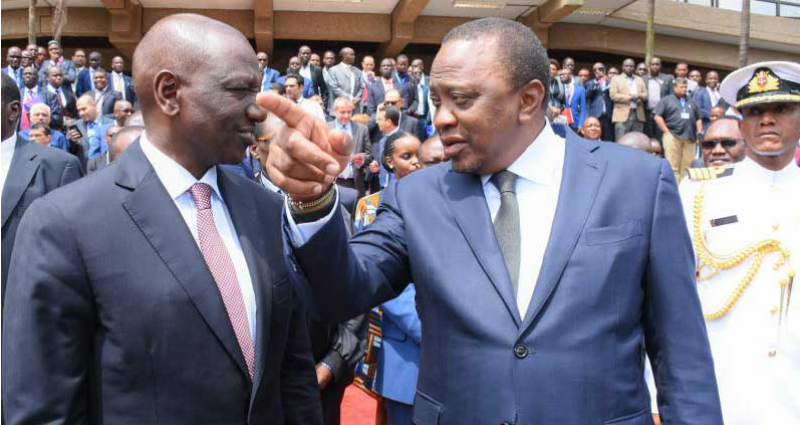Succession Politics and the Renewed Threat of Ethnic Violence in Kenya
Editor’s Note: Kenya’s politics often appear peaceful, but they are punctuated by dangerous periods of intense violence, particularly during election season. For now, Kenya’s main groups are at peace, but Narrelle Gilchrist of the University of Chicago argues that Kenya’s stability may be short lived. A refusal to compromise among key groups is escalating tension that, if not defused, could lead to a return to past violence in the lead-up to the 2022 election.
Daniel Byman
***

Published by The Lawfare Institute
in Cooperation With

Editor’s Note: Kenya’s politics often appear peaceful, but they are punctuated by dangerous periods of intense violence, particularly during election season. For now, Kenya’s main groups are at peace, but Narrelle Gilchrist of the University of Chicago argues that Kenya’s stability may be short lived. A refusal to compromise among key groups is escalating tension that, if not defused, could lead to a return to past violence in the lead-up to the 2022 election.
Daniel Byman
***
Recent rifts in the Jubilee Party, Kenya’s ruling political coalition, threaten to return the country to ethnic conflict akin to the 2007 postelection crisis that left more than 1,000 people dead. Since 2013, the unlikely political partnership of President Uhuru Kenyatta and Deputy President William Ruto has kept the long-standing tensions between their respective ethnic groups, the Kikuyu and the Kalenjin, to a minimum. Their truce now appears to be falling apart, and it is increasingly likely that Kenyatta and his supporters will renege on their promise to support Ruto as Kenyatta’s successor. This shift could prompt severe ethnic tension and political violence. Fortunately, three years remain before the next presidential election—time that can be used to take unifying steps, such as reforming Kenya’s Independent Election and Boundaries Commission and restructuring the executive branch to reduce the stakes of elections. Given the importance of Kenya as a key U.S. partner and regional leader, it is in the interest of Kenyans and international observers alike to heed the early warning signs of ethnic conflict and do what they can to prevent a bloody, destabilizing election in 2022.
Shifting Alliances and Political Tensions
In the absence of strong, ideologically based political parties, Kenyan politicians win elections primarily by securing the support of ethnically mobilized blocs of voters. Kalenjin voters in the Rift Valley supported Kenyatta in both 2013 and 2017—votes that were critical for his victory—largely because of their understanding that Kikuyu voters in Mount Kenya would return the favor for Ruto in 2022. Now, however, Kikuyu elders deny that such a pact ever existed. In a system known for ethnic patronage and the marginalization of those out of power, many Kikuyus may be unwilling to cede power to a member of a rival ethnic group and give the Kalenjin “their turn to eat.” In the assessment of at least one political analyst, the Kikuyu, who have held power for most of Kenya’s independence, will “hardly vote for anyone who is not a Kikuyu.”
With talk of 2022 dominating Kenyan politics, Ruto has been increasingly sidelined and criticized from within the Jubilee coalition. Key Kikuyu politicians, most notably Daniel Murathe, former vice chairman of the Jubilee Party, have decried Ruto as corrupt, power hungry and unfit to be president. Ruto and his allies, in turn, have claimed that Kenyatta’s recent anti-graft campaign, rather than being a genuine attempt at reform, is a political maneuver designed to discredit him. The recently ousted finance minister, Henry Rotich, who was arrested on corruption charges, was a Kalenjin who had been appointed at Ruto’s request. Ruto has also seen his policy portfolio shrink and has accused leaders from Mount Kenya of plotting to assassinate him.
Kenyatta, meanwhile, has shown signs that his endorsement in 2022 might not go to Ruto. Over the past year, he has conspicuously avoided voicing support for Ruto’s presidential ambitions, recently declaring instead that God will determine Kenya’s next leader. Kenyatta’s allies, concerned with ensuring his legacy, have expressed disdain for Ruto’s “early campaigning,” complaining that it takes attention away from the president’s ambitious development agenda. Kenyatta has also failed to condemn anti-Ruto comments from close allies like Murathe, and some observers have suggested that these leaders are speaking for the president.
Kenyatta, ironically, may give his support to another former rival instead: longtime opposition leader Raila Odinga, who is a member of the Luo ethnic group. In March 2018, the two leaders met and publicly shook hands, marking the start of a thus far cordial relationship. This handshake, promoted as a step toward national unity, has been interpreted by some as part of the effort to sideline Ruto, possibly in favor of a new Kikuyu-Luo partnership. Such a move would mark a departure from the adversarial relationship between the Kikuyu and the Luo that has persisted since the early days of independence, when one prominent Luo politician was removed from the Kikuyu-led government and another was assassinated. Intense uncertainty remains, however, and the next few years are likely to bring jockeying on all sides. Additional candidates, perhaps including a Kikuyu, could emerge. However, what seems certain is that at least some possibly vocal Kikuyus will vote against the deputy president, angering Kalenjins who supported Kenyatta in 2013 and 2017 with the understanding that the favor would be returned in 2022.
Preventing Violence
The dissolution of the Jubilee pact would most likely spark renewed fighting between the Kikuyu and the Kalenjin, particularly in Kenya’s Rift Valley. The Rift Valley, a region with historic land disputes between the two groups, was the site of some of the worst fighting in 2007, much of which was between the Kalenjin and the Kikuyu. More than a decade later, animosity still lingers, justice has never been served, and many Kenyans who were displaced by the violence have faced difficulties resettling. Divisions were calmed, but not healed, by the coalition between Kenyatta and Ruto, with one Rift Valley resident describing the situation as “negative peace.” The end of the fragile alliance could easily bring about a return to the hostilities of 2007, especially if Ruto loses the 2022 election. Indeed, after conducting surveys in the region, the International Crisis Group assessed, “Failure by the Kikuyu side of the Jubilee coalition to endorse Ruto in 2022 almost inevitably would trigger major instability in the Rift Valley.”
With this outcome appearing increasingly likely, it is crucial to ask what can be done to minimize the risk and intensity of ethnic violence in the lead-up to and aftermath of the 2022 election. Already, two potentially unifying measures have received a great deal of attention in Kenya, though they will need more support if they are to succeed.
Overhauling the Independent Election and Boundaries Commission
A general lack of trust in the mechanisms of Kenya’s elections is one driver of post-election discontent and violence, and restoring faith in the country’s electoral process could thus be essential in preventing widespread anger over the results of the polls in 2022. Currently, Kenya’s Independent Election and Boundaries Commission (IEBC) is in dire need of reform after its poor performance in the disputed 2017 election, when the Supreme Court ruled that the IEBC’s first results were invalid. The IEBC has little to no credibility among Kenyans and, following the resignation of several commissioners, is in a position where running a presidential election today would not be possible. Several ideas are on the table to streamline the IEBC budget, improve transparency in its procedures and fill the commission’s vacancies. These reforms could help prevent outbreaks of electoral violence in 2022. In fact, a 2018 study from the United States Institute of Peace found that improving election administration was one of the most effective ways to prevent election violence. Time, however, is running short, and politicians may need to expedite the reforms’ passage through the legislature in order for them to be enacted in time.
Lowering the Stakes of Elections
Reducing the “winner-takes-all” mentality that continues to define Kenyan elections could also be an effective way to prevent electoral violence. The Kenyan president enjoys a great deal of executive power, making elections a zero-sum game that an ethnic group must win. While Kenya’s 2010 constitutional reforms attempted to address this driver of election violence, they were only partially successful, and Kenyatta has been called another “imperial” president. Additional reforms—for instance, the creation of a parliamentary system—could go further in creating a more inclusive and less powerful executive branch and, thus, significantly lower the stakes of national elections. To varying degrees, Kenyatta, Odinga, and Ruto have all voiced support for a referendum on constitutional reforms, but the details of the process face intense political controversy. Ruto has criticized many of the most often cited proposals, and his allies in Jubilee may derail the efforts of the reform task force, the Building Bridges Initiative, started by Kenyatta and Ruto. In addition to these political hurdles, it could be difficult to hold a referendum prior to the 2022 election, though the promise of a referendum could also aid in reducing intergroup animosity over the election outcome. A successful reform movement would require significant technical support and funding for the electoral process, as well as greater willingness on the part of Ruto and his supporters to discuss the suggested reforms.
Where possible, the United States and other international actors should provide technical and financial assistance for these measures and encourage Kenyan politicians to work toward peace. Neglecting the problem may lead to a recurrence of violence, perhaps at even higher levels than in the past. With signs of danger clear already, the time remaining before 2022 must be used for preventive action.





